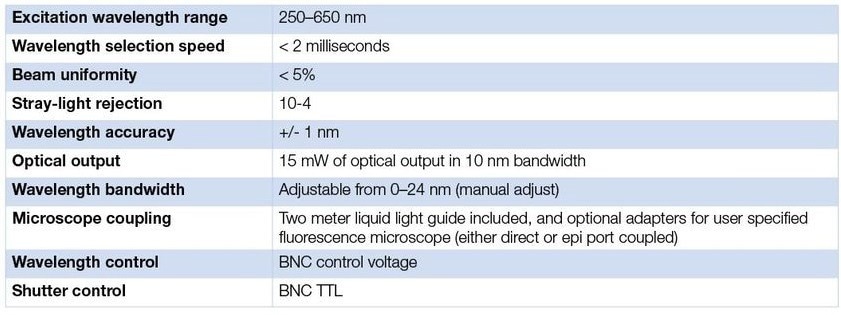Quantitative intracellular ion research benefits substantially from using the patented DeltaRAM™ X microscope Illuminator. It uses a Random-Access Monochromator (RAM), which is based on galvanometers and capable of switching between any wavelength in 2 milliseconds.
A power supply, high-intensity xenon light source, DeltaRAM™ X monochromator, TTL shutter, and flexible liquid light guide are all included in the self-contained, whole illuminator known as the DeltaRAM™ X.
A simple analog voltage control is used to set the wavelength. A microscope adapter for the fluorescence microscope and a USB or PCI DAC interface, depending on the software the user will be using to operate the illuminator, are all that is needed to complete the setup.
Typical Cellular Applications
- Ca2+ transients
- Ca2+ mobilization
- Ca2+ waves
- Ca2+ oscillation
- Ca2+ spikes
- Ca2+ entry
- Calcium
- Potassium
- Magnesium
- Membrane potential
- Capacitative Calcium Entry (CCE)
- Mitochondrial Ca2+
- Endoplasmic reticulum (ER) Ca2+ pool
- Lysosomal Ca2+
- Extracellular near membrane Ca2+
- Molecular binding
- Molecular interactions
- Protein conformation
- Gene interactions
- Reaction kinetics
- FRET
- pH
- Sodium
Features
Key benefits of the DeltaRAM™ X Illuminator
- TTL shutter
- Couplers for all fluorescence microscopes
- Millisecond wavelength switching (and scanning) microscope illuminator
- Tunable wavelengths anywhere from 250 to 650 nm
- Continuously adjustable bandpass
- No alignment required and uniformity assured
Specifications
Source: HORIBA Scientific
